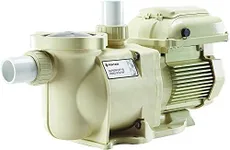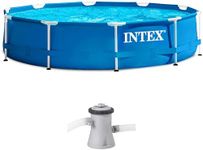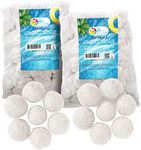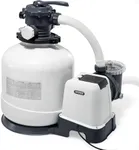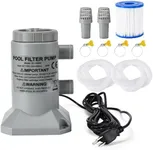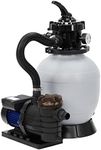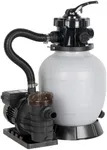Buying Guide for the Best Pool Pumps And Filters
Choosing the right pool pump and filter is essential for maintaining clean and clear water in your swimming pool. The right equipment will ensure efficient circulation and filtration, keeping your pool free from debris and contaminants. When selecting a pool pump and filter, it's important to consider several key specifications to ensure you get the best fit for your pool's size, type, and usage. Understanding these specifications will help you make an informed decision and keep your pool in top condition.Pump Flow RateThe pump flow rate, measured in gallons per minute (GPM), indicates how much water the pump can move in a given time. This spec is crucial because it determines how quickly your pool water is circulated and filtered. For small pools, a lower flow rate (30-50 GPM) may be sufficient, while larger pools may require a higher flow rate (75-100 GPM or more). To pick the right flow rate, consider the volume of your pool and how often you want the water to be completely circulated. A good rule of thumb is to choose a pump that can circulate all the water in your pool within 8 hours.
Pump HorsepowerPump horsepower (HP) measures the power of the pump's motor. This spec is important because it affects the pump's ability to move water efficiently. Pumps typically range from 0.5 HP to 3 HP. For smaller pools or pools with fewer features (like waterfalls or spas), a lower horsepower pump (0.5-1.5 HP) may be adequate. Larger pools or those with additional features may require a higher horsepower pump (2-3 HP). To choose the right horsepower, consider the size of your pool and any additional water features that may require more power.
Filter TypeThere are three main types of pool filters: sand, cartridge, and diatomaceous earth (DE). Each type has its own advantages and maintenance requirements. Sand filters are easy to maintain and cost-effective, making them suitable for most residential pools. Cartridge filters provide better filtration and are easier to clean, ideal for pools with higher usage. DE filters offer the best filtration but require more maintenance and are typically used for larger or commercial pools. To pick the right filter type, consider your pool's size, usage, and how much maintenance you're willing to perform.
Filter SizeFilter size, often measured in square feet for cartridge and DE filters or in tank diameter for sand filters, determines the filter's capacity to clean the water. A larger filter can handle more debris and requires less frequent cleaning. For small to medium-sized pools, a filter with a capacity of 50-100 square feet (cartridge) or a 16-20 inch diameter (sand) may be sufficient. Larger pools may need a filter with a capacity of 200 square feet or more (cartridge) or a 24-30 inch diameter (sand). To choose the right filter size, consider the volume of your pool and the amount of debris it typically collects.
Energy EfficiencyEnergy efficiency is an important consideration for both environmental and cost reasons. Energy-efficient pumps use less electricity, which can significantly reduce your utility bills. Look for pumps with variable speed motors, as they can adjust their speed to match the pool's needs, using less energy overall. To pick an energy-efficient pump, check for models with ENERGY STAR certification or those that advertise variable speed capabilities. Consider how often you run your pump and the potential savings on your energy bill.
Noise LevelThe noise level of a pool pump can affect your overall pool experience, especially if your pool is located near living areas. Quieter pumps are generally more pleasant to be around and can reduce noise pollution. Noise levels are usually measured in decibels (dB). Pumps with noise levels below 60 dB are considered quiet, while those above 70 dB may be noticeably loud. To choose the right noise level, consider the location of your pool and how much noise you're willing to tolerate. If noise is a concern, look for pumps specifically designed to operate quietly.
